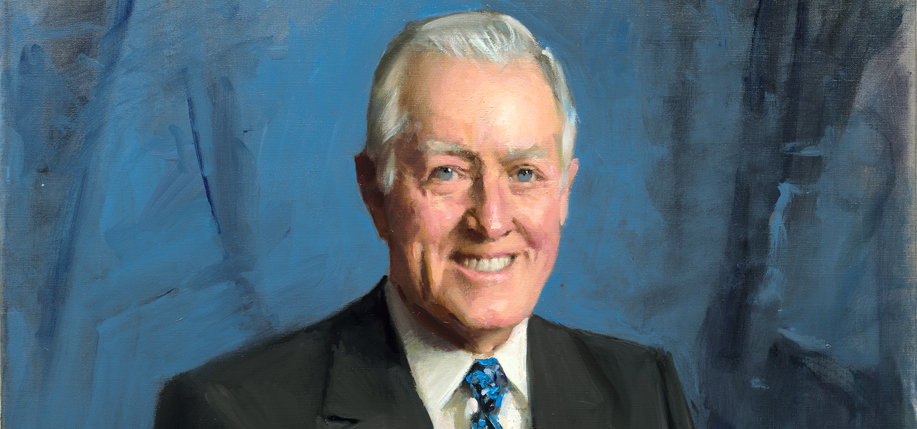Whenever I think of Bill Flynn, I think of the quote that is attributed to John F. Kennedy: “One person can make a difference and each person should try.”
Bill Flynn did make a difference, and how he tried. He was fearless in his attention to Northern Ireland and his belief that with Irish American help the “Troubles” could be brought to an end.
Looking back now I’m just as amazed by his audacity. And at the risks he took. As a corporate business leader his reputation was everything. He had built up his company, Mutual of America, from the ground up and he was putting his reputation on the line, all for a country that he wasn’t born into, wasn’t running for political office in, and didn’t have any business interests in – a country that his parents had left a long time ago. So many people turned their backs on Northern Ireland. Bill didn’t.
I first met Bill in 1990 at an Irish America Business 100 lunch at the 21 Club. My first impression was that he was not someone you did take lightly – he has a commanding presence. My next meeting with Bill was shortly thereafter, again over lunch, where I saw his discerning mind come into play, and his ability to listen empathetically. I had just come back from interviewing Gerry Adams and he was interested in getting my take on Adams. And I told him – about the Sinn Féin office in Belfast, with its intimidating bullet-proof door and security camera, the narrow stairs that took me up to the meeting room with its mismatched furniture, the pot of tea and biscuits, and how Adams had patiently answered my questions, spending more time with me than was scheduled, even as he was preparing for a pending party conference, and wanted to send the message to Irish America that “it was time for all-party talks.”
The rest is history.
Bill had already been contacted by Irish America’s publisher Niall O’Dowd and asked to get involved in bringing the “Troubles” to an end. He not only got involved, he brought his considerable weight as a corporate leader to bear in legitimizing a new way forward – one that would move Northern Ireland away from the bomb and towards the ballot box. And in his capacity as president of the non-governmental National Committee on American Foreign Policy, he not only helped bring about the IRA ceasefire by helping to procure a U.S. visa for Adams, he provided a forum, most often at lunches at Mutual of America, at which leaders, community and otherwise, from across the Northern Irish divide, got to air their grievances.
I enjoyed many lunches with Bill Flynn over the years, and came to know him as a friend. I often sought his wise counsel. He is a great storyteller, and one personal story of his, which struck a chord, was how his father would bring people home for meals during the Depression. When Bill asked him, with a young kid’s curiosity, why his neighbor was eating at their house more often than his own, his dad answered, “because I have a job and he doesn’t.”
Bill’s father was from County Tyrone – he had known the Troubles. His mother was from County Mayo, a beautiful but poor county, which was decimated during the Irish Famine. Both of his parents – perhaps born from their own personal experience – had empathy for others, an ability to put themselves in someone else’s shoes. While Bill’s father did the inviting, it was his mother who did the cooking and the family who shared the meal.
The beauty and tragedy of Ireland is in our DNA – in Bill Flynn’s case the empathy he learned at his parents table is what made him the kind of person who did not turn his head away from the Troubles.
“One person can make a difference and each person should try.”
Bill Flynn not only tried – he did make a difference.
_______________
End Note: In 2008 we devoted a special issue of Irish America to Bill Flynn that showcased his life and his contribution to Ireland. I wrote the above Last Word piece for that issue. Yesterday, June 3rd, I attended Bill’s funeral mass and listened to his son, also named Bill, talk about his father in a heartfelt eulogy that struck a chord with the audience. “He always listened. There were never recriminations. He just wanted what was best for you,” the son said of the father. In many ways, and for many years, Bill was a father figure in the Irish American community, and we mourn his loss as we extend our condolences to Peg, his wife of 65 years, and his loving family.
What I will remember most about Bill is his optimism. I will leave you with this final quote from him:
“No pessimist ever set foot on Ellis Island, no pessimist ever crossed the prairies, and no pessimist ever built cities from one of the continents to the another. These things were done by people with vision and hope.” To read the tribute issue in its entirety, click here ♦


Ar dheis Dé go raibh a anam dílis